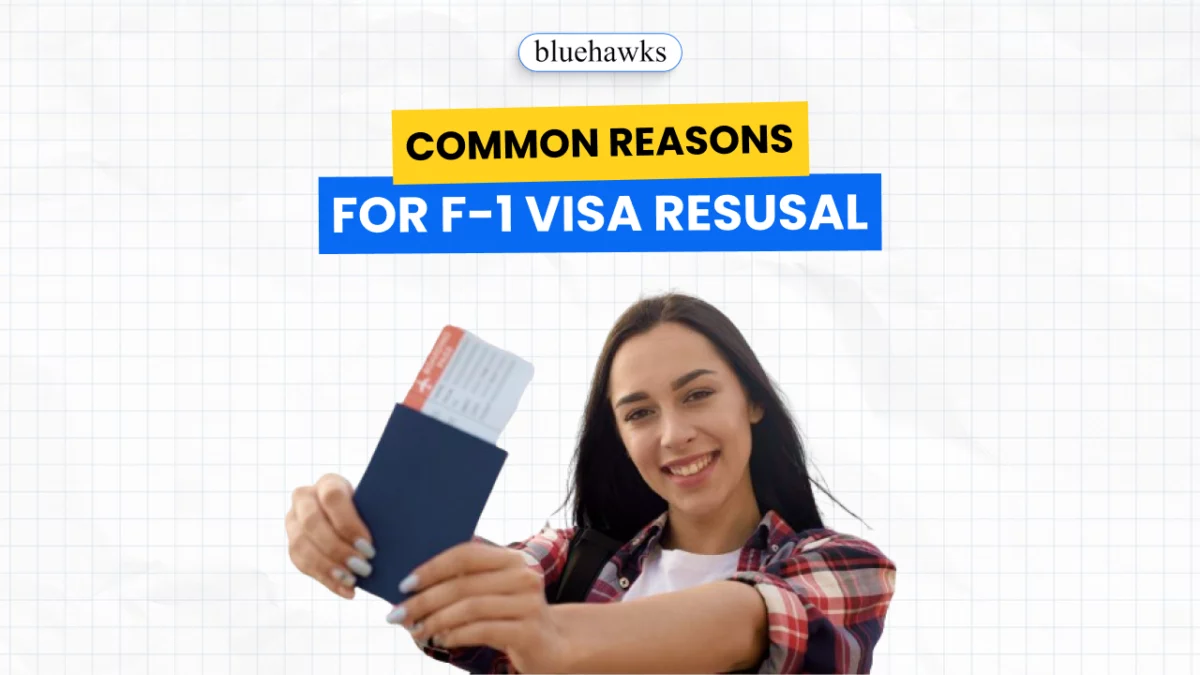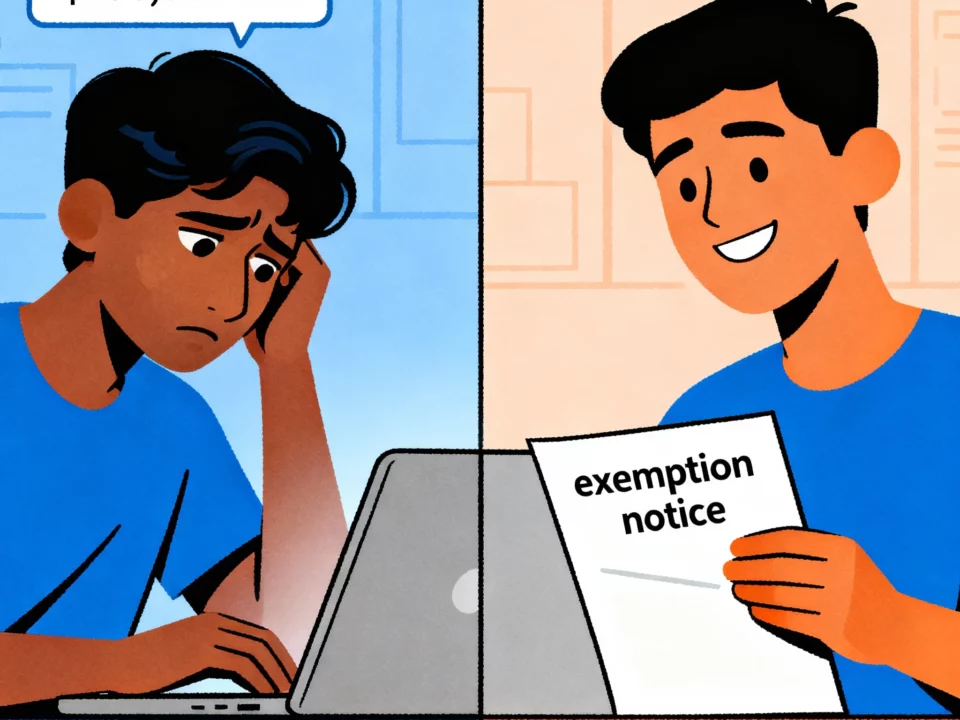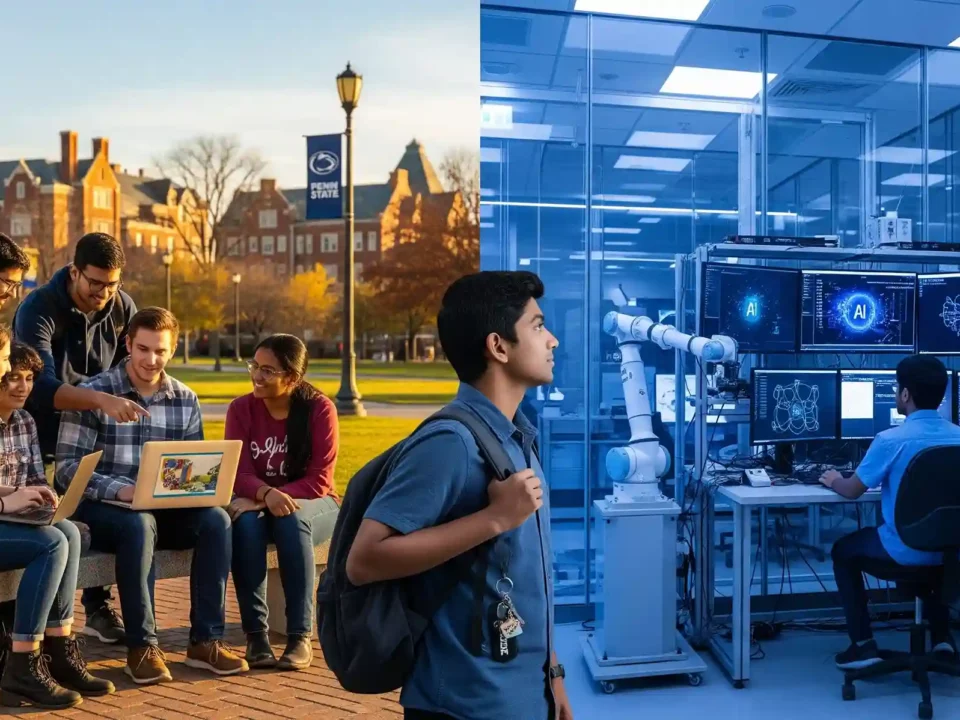Most Common Reasons for F-1 Visa Refusal

Most Common Reasons for F-1 Visa Refusal
Estimated reading time: 11 minutes
You’ve been accepted by a US university and received your I-20 form with instructions on applying for an F-1 visa. You might even have an appointment scheduled at the consulate or embassy. It’s normal to feel both excited and a bit nervous about traveling to another country. Maybe you’re concerned about your F-1 Visa Refusal. Visa denial rates have risen recently, especially in Asian and African countries, so it’s important to know the common reasons for visa rejections to be well-prepared.
Table of contents
- Most Common Reasons for F-1 Visa Refusal
- Common reasons for F-1 Visa Refusal
- 1. Unsuccessful Visa Interview
- 2. Late Visa Application
- 3. Insufficient Evidence of Intent to Return
- 4. Country of Origin
- 5. Inadequate English Proficiency
- 6. Failure to Comply with F1 Visa Rules
- 7. Technical Issues
- 8. Applicant Profile
- 9. Financial Documentation
- 10. Previous U.S. Presence and Violations
- 11. Inadmissibility and Criminal History
- 12. Other Factors
- 13. Lack of Finances
- Common types of F-1 Visa Refusal
- My Options after my F-1 Visa Refusal
- Steps to Follow After Your F-1 Visa Refusal
- Common reasons for F-1 Visa Refusal
If your student visa application is denied, it means there was an issue or something missing. But don’t worry, you can apply again. There’s no limit to the number of times you can apply for a student visa. However, each application should be different. If you lie or provide false information, you will be permanently banned from getting a visa. This is why it’s important to understand why student visas get denied and how to fix those mistakes.
Common reasons for F-1 Visa Refusal
In 2022, about 35% of F-1 visa applications were denied, but the denial rate varies greatly by country. For example, that same year the F-1 denial rate for Indian students was 35% while it was only 9% for European students. No matter where you are from, when a student visa is denied, there will usually be a specific reason listed. Below we highlight the most common reasons why F-1 student visas get denied.
1. Unsuccessful Visa Interview
When you apply for an F1 visa, you must attend an interview at the embassy or consulate. This interview usually lasts only 2-3 minutes, but it’s very important. You need to clearly explain why you chose the USA and the specific university or college. If you can’t do this well, your visa might be rejected. It’s important to be honest and confident.
2. Late Visa Application
If you apply for your visa after the start date of your program, as shown on your I-20 or DS-2019 form, your application can be denied. It’s always better to apply early to avoid this problem.
3. Insufficient Evidence of Intent to Return
You need to show that you plan to return to your home country after finishing your studies. If the consulate officer doubts that you will return, they might reject your visa.
- Close family members in your home country
- Property ownership in your home country
- Other financial ties to your home country
- A job offer in your home country upon graduation
- Participation in an organization or community in your home country
- A clean visa immigration history
Know how to prove ties to Home Country for an F1 Visa
4. Country of Origin
Sometimes, applicants from economically developed and politically stable countries have an easier time getting visas compared to those from less developed countries.
5. Inadequate English Proficiency
Besides the English test scores you submitted to your college or university, you will need to demonstrate your English proficiency during your interview with the consular officer. You can prepare by practicing with a native English speaker. Some example questions you might be asked include:
- Have you been to the US before?
- Do you have family, relatives, or friends in the US?
- What will you be studying?
- Why did you choose that college/university?
6. Failure to Comply with F1 Visa Rules
If you have previously broken F1 visa rules, like not maintaining full-time enrollment or working without authorization, your visa can be rejected. Admitting to illegal activities can also lead to rejection.
7. Technical Issues
Mistakes in your application or problems with the SEVIS system can cause delays or rejections. Applying after your program start date can also lead to rejection.
8. Applicant Profile
If the consulate officer thinks you lack clear academic or career goals, especially if you’re in your 20s, they might see you as a risk. Poor English skills, inability to explain your plans, or negative body language can hurt your chances.
9. Financial Documentation
You must prove you have enough money to cover your education and living expenses. If the consulate officer doubts your financial stability, they might reject your visa.
10. Previous U.S. Presence and Violations
If you’ve previously stayed in the U.S. without proper authorization or have a poor academic record, your visa might be denied. Previous visa rejections or status changes (like from tourist to student) can also be a problem.
11. Inadmissibility and Criminal History
Any arrests or criminal history can lead to visa rejection. Even temporary refusals can have long-term consequences if they cause you to miss a semester.
12. Other Factors
- Geopolitical Tensions: Political issues between the U.S. and your home country can increase refusal rates.
- Misrepresentation: Any discrepancies or false information in your application can lead to rejection.
- Health, Criminal, Security Violations: These can make you inadmissible.
- Romantic Relationships: If you have a U.S.-based sponsor, the consulate officer might question your true intentions.
- Social Media Presence: If your social media shows you as a “party animal” or “spoiled rich kid,” it can negatively impact your application.
- Travel Experience: Limited travel experience can be seen as a sign of financial instability.
- Job Changes: Frequent job changes or unemployment might make you look like you lack direction.
- Program Alignment: You need to clearly explain how your chosen program fits your goals.
- Disinterest: Appearing disinterested or lacking ambition can hurt your chances.
- Family in the U.S.: Not reporting relatives in the U.S. can be considered misrepresentation.
- Relatives Seeking Asylum: This can raise concerns about your intentions.
- Previous Visa Overstays: Even unintentional overstays can lead to refusal.
- Political Tensions: Broader political tensions can lead to higher refusal rates.
- Behavior Changes: Changing visa types or applying separately from dependents can be seen as attempts to circumvent the system.
13. Lack of Finances
You must show that you have the financial means to pay for your education and living expenses in the U.S. for the entire duration of your program. This includes tuition, insurance, dining, living expenses, books, and miscellaneous costs. If you can’t prove this, your visa can be denied.
Know more: US Student Visa Financial Requirements
Common types of F-1 Visa Refusal
If you get F-1 Visa Refusal, the consular officer should provide a reason for the denial. If they don’t, contact them to ask for the reason. There is no appeal process after a visa denial, so you’ll need to start over and submit a new application. However, understanding the reason for the denial is crucial so you can address and correct the issue.
You might wonder about the difference between visa rejection, refusal, and denial. In fact, these terms are often used interchangeably and mean the same thing. If your visa is not approved, there are three possible next steps:
- Additional Documentation: You might be asked to provide more documents for your current application.
- Additional Processing Time: More time may be needed to process your current application.
- New Application: Your current visa application could be denied, requiring you to submit a new application.
| Reason | Explanation |
|---|
| INA section 221(g) | Your application is incomplete or additional documentation is required. No new application is needed. |
| INA section 214(b) | You failed to show that you intend to return to your home country after your studies or that you qualify for the F-1 student visa. |
| INA section 212(a)(4) | You did not demonstrate that you have enough financial resources to fund your education and living expenses in the US during your school years. |
| INA section 212(a)(9)(B)(i) | You previously entered the US unlawfully or overstayed a visa. |
| INA section 212(a)(6)(C)(i) | There is evidence that you committed fraud or lied in an attempt to get a US visa. This results in a permanent denial, so you cannot reapply. |
Source: US Department of State – Bureau of Consular Affairs
My Options after my F-1 Visa Refusal
Although this isn’t the best scenario, getting denied an F1 visa is not a reason to lose hope. You still have some options available:
1. Reapply for F-1 Visa Refusal
If you’re determined to study in the U.S., you can reapply for the F-1 visa refusal. Take some time to understand why your application was denied and address those issues before reapplying.
2. Education in Other Countries
If studying abroad is your final decision, there are plenty of world-class universities in other countries that offer the same quality of education, sometimes at a lower cost. For example:
- Australia, Canada, and Europe have many high-ranked universities along with U.S. universities in the world rankings.
- The visa process in these countries is often less strenuous. With great facilities and opportunities, these countries can be ideal choices.
- You can still come to the U.S. later after completing a course in another country.
3. Applying for a Job
Your final aim might be to secure a good job, so why not start now? There are ample employment opportunities available according to your qualifications. All you need is a good resume.
- Education can still be an option, and work experience will only add more points to your profile.
- Many people opt to go for higher studies after gaining some work experience, like an Executive MBA.
- Work experience also provides real-world training and gives the consulate a reason to believe that you would return to your job after completing your studies.
4. Pursuing Courses While Applying Again Next Year
If you have to wait another year to reapply, use that time to undertake some courses of interest.
- Most universities in the U.S. have prerequisites before you can start a course. These prerequisites can take a substantial amount of time, so catching up on these courses is a good idea.
- Some courses might be available online. They will improve your knowledge and may help you finish your course faster and get a good job after graduation.
5. Studying in Your Home Country
Many good colleges offer quality education and ample job opportunities in your homeland.
- Prepare for and attempt the necessary tests to secure admissions to these colleges.
- It is always beneficial to study in your country, as education can help you better the situations in your home country.
- This tactic can open up other opportunities later in life.
Remember, an F1 visa denial is just a setback, not the end of your dreams. There are many paths to success!
Steps to Follow After Your F-1 Visa Refusal
If your F1 visa gets rejected, don’t worry! Here are some simple steps to help you understand what to do next and how to reapply.
Understand the Reasons Behind the F-1 Visa Refusal
When your visa gets denied, you’ll receive a rejection letter that explains why. Make sure to read it carefully and understand the reasons given.
Find a Solution to the Problem
Once you know why your visa was denied, you can work on fixing the problem. Here are some common issues and how to address them:
- Not Enough Savings or Funds: Make sure you have enough money to cover your stay. You might need to show more savings or find a reliable sponsor.
- Intent to Return Home: Be clear about your plans to return home after your studies. You might need to explain this better in your next interview.
If the issue is legal, consider getting help from a lawyer or an official in charge.
Reapply
After addressing the reason for your denial, you can reapply for your F1 visa refusal. Follow these steps:
- Complete a New Visa Application Form (DS-160): Fill out the form again and make sure all information is accurate.
- Pay the Visa Application Fee: You’ll need to pay the fee again.
- Schedule a New Visa Interview Appointment: Go to the website of the U.S. Consulate or Embassy to schedule your appointment.
Prepare for the Visa Interview
Before your interview, make sure you:
- Gather Additional Supporting Documents: Bring any new documents that strengthen your case.
- Prepare Thoroughly: Think about the questions you might be asked and practice your answers.
- Have All Required Documents: Make sure you have everything you need for the interview.
Attend the Interview
On the day of your interview:
- Arrive on Time: Being punctual shows that you are serious.
- Explain Your Intentions and Qualifications Clearly: Be honest and clear about why you want to study in the U.S. and your plans for the future.
Insider Tip: Begin the reapplication process as soon as you can, since it might take a while to get F1 Visa slot for refusal students. It’s important to secure your visa before the school year starts. Also, check other consulates in your country, as they might have earlier appointment slots available.
Conclusion
A student visa denial can be worrying, but it doesn’t have to be overwhelming. Understanding why F-1 student visas get rejected can help you avoid or fix those issues. The most common reason for denial is not showing that you plan to leave the US after graduation. Other frequent reasons include not proving you’re qualified for the program or not having enough money to cover tuition and living costs. With proper preparation, you can successfully complete the F-1 visa application process, whether it’s your first time applying or you’re reapplying after a denial.
How bluehawks Can Help after your F-1 Visa Refusal
You can overcome your visa refusal with the help of bluehawks. More than 1 in 3 international students will face a visa denial at their F-1 interview. bluehawks offers a range of services to help you succeed in your next attempt:
- Mock Interviews: Practice your interview skills with our experts to boost your confidence.
- Live Q&A Sessions: Get real-time answers to your questions and concerns.
- Detailed Feedback: Receive insights to highlight your strengths and address weaknesses in your applicant profile.
- Strategic Approaches and Responses: Learn effective strategies and responses for common interview questions.
- In-Depth Review of Your Visa Application (DS-160): Ensure your application is complete and accurate.
With bluehawks, you get the support you need to enhance your strengths, address any weaknesses, and increase your chances of getting your F-1 visa.



